When China reached full age
Adelina Marini, October 15, 2010
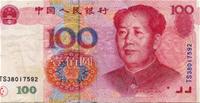 Reaching full age is a special stage of becoming an adult. Then a person goes out of his parents' guardianship and starts learning the life lessons ... on his own. Sometimes he could listen to the pieces of advice of the tutors but might also decide to prove himself alone, especially if the "adults" had overdone with the pressure. I think that this comparison can be freely used for giant China in its relations with the West (the guardians). Even while it was growing up China received Western tutelage in the form of investments, agreements, stimuli. In a moment, however, the child grew up big and decided that it can do alone with its life.
Reaching full age is a special stage of becoming an adult. Then a person goes out of his parents' guardianship and starts learning the life lessons ... on his own. Sometimes he could listen to the pieces of advice of the tutors but might also decide to prove himself alone, especially if the "adults" had overdone with the pressure. I think that this comparison can be freely used for giant China in its relations with the West (the guardians). Even while it was growing up China received Western tutelage in the form of investments, agreements, stimuli. In a moment, however, the child grew up big and decided that it can do alone with its life.
Everything was going relatively smooth until the beginning of the Crisis. Then the big rifts in the globalised economy started to be visible. Those with the large trade and budgetary deficits, as well as with the huge debts, started to protest against the countries with strong trade surpluses (the export countries), with big currency reserves, low budgetary deficits and public debt. The core of the conflict is that the former are a market for the latter, but the latter do not benefit from it, on the contrary - they become even more and more indebted.
G20
It was in the climax of this clash (which, in fact, turned into a very serious problem in the EU, where Germany is an export country with a well developing economy and tight fiscal policy), when the format of global negotiations has changed. The West, whose strongest representatives dictated global policies in the Group of the Seven most industrialised countries in the world, later joined for political reasons by Russia, in the end of the day has come to realise the scale of globalisation. This resulted into the closure of the G8 as a global forum for solving global issues and its extension to the G20 to include not only the most economically developed countries but also those which a few years ago were being referred to as developing but the investors started calling them emerging markets.
To some extent this change softened the conflicts because thus a consensus has been reached on what measures should be taken in order to reform global economic governance, global financial institutions, as well as national policies. Even then, however, the seeds of the current conflict have been planted. Some leading international media have even started to call this conflict "currency wars". Although two years ago the G20 leaders agreed that any form of protectionism would hamper global econoicy recovery, as well as national economies, because this still is a serious problem.
There will be renminbi for all
At the heart of the conflict is the low exchange rate of the Chinese national currency the yuan or, as it is also known - the renminbi. The problem, however, is not that the yuan is simply with a low exchange rate but that it is being suppressed by the Chinese authorities in order exports to be stimulated, thus allowing the fast growth of the Chinese economy. This creates serious problems in global trade and forces other countries to respond in order to boost their own exports. Japan has already responded by lowering the interest rate to 0% and Brazil has announced that it is doubling the tax on foreign capital flows. India also threatened that it would reciprocate unless the situation is put under control.
Beijing's arguments for the suppression of the renminbi are that if left to appreciate freely by the markets, this might lead to serious social unrest in China because many factories would be forced to shut down, unemployment would jump and the government would lose control over the situation. In an atmosphere of a big debt crisis in the EU and in the US (with unsustainable economic growth and hesitant investments), the transatlantic partners are not keen at all to understand the Chinese problems. The case is - either you will have high unemployment or we.
The EU's and US's logic, although not expressed aloud, is that many unemployed would lay on the budget which in many EU Member States, and the US as well, is under strong pressure. China has good data for the situation of its treasury, the debt level is low and the country can afford handling more unemployed on social assistance.
What is the leverage
For now China is acting typically as a person who has just come of an age, who 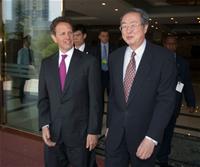 is reluctant to accept pieces of advice and wants to try his life on his own without taking into account the consequences. The West still has leverage that can be applied. For example, the American Treasury Secretary Tim Geithner directly said that the reform of the quota representation in the IMF can be agreed if measures on the currency front are undertaken.
is reluctant to accept pieces of advice and wants to try his life on his own without taking into account the consequences. The West still has leverage that can be applied. For example, the American Treasury Secretary Tim Geithner directly said that the reform of the quota representation in the IMF can be agreed if measures on the currency front are undertaken.
"We want to make sure these changes go far enough in rebalancing rights and responsibilities of the members of the institutions [that are part of the IMF]. And for this reason, an agreement to modernize the governance of the IMF needs to be accompanied by more progress in encouraging countries, particularly the surplus countries, to pursue more market-oriented exchange rate policies and policies that will reduce reliance on exports and strengthen domestic demand".
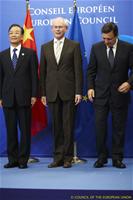 In the meantime, during a business forum in Brussels in the first week of October and on the eve of the EU-China summit, a strong appeal has been made for renminbi's appreciation. In fact, an interesting detail related to this summit is that before it another summit took place in Brussels - EU-Asia. It became clear that the Asian countries and the EU share common positions on many of the global issues, but the problem with exchange rates did not find a place in the official documents after the summit. The same happened with the long-anticipated EU-China summit. Even worse was that the planned press conference after it was canceled.
In the meantime, during a business forum in Brussels in the first week of October and on the eve of the EU-China summit, a strong appeal has been made for renminbi's appreciation. In fact, an interesting detail related to this summit is that before it another summit took place in Brussels - EU-Asia. It became clear that the Asian countries and the EU share common positions on many of the global issues, but the problem with exchange rates did not find a place in the official documents after the summit. The same happened with the long-anticipated EU-China summit. Even worse was that the planned press conference after it was canceled.
Instead, in his speech for the opening of the business forum the European Commission president Jose Manuel Barroso mentioned the problem, although in the very end of his short speech. "On European side, we stated our position considering that China's structural reforms should be complemented by an orderly and broad based appreciation of the Chinese currency exchange rate. Letting the adjustment fall only on Europe could be damaging for the Euro area recovery".
The leverage about which the Trade Commissioner Karel de Gucht hinted is 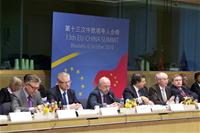 reciprocity - whichever country would stimulate protectionism, the EU would reciprocate with the same. Still it is not clear, though, to what extent Brussels is ready to impose such a measure. This would become clear after the Commission would present its concept for an overall trade strategy of the Union. Already several members of the European Parliament have warned that such measures might cause not just currency wars, but to unleash a world trade war.
reciprocity - whichever country would stimulate protectionism, the EU would reciprocate with the same. Still it is not clear, though, to what extent Brussels is ready to impose such a measure. This would become clear after the Commission would present its concept for an overall trade strategy of the Union. Already several members of the European Parliament have warned that such measures might cause not just currency wars, but to unleash a world trade war.
Economic convergence
By the way, we have probably got used to the term convergence around the problems in the euro area and the EU as a whole. The main drama in the monetary union earlier this year was not caused simply because Greece lied about its fiscal situation but because the country was not economically prepared to join the single currency. The Greek downfall led to the realisation that the various stages of development of the compound economies in the eurozone are the reason for the euro area crisis. This is a problem not only for the countries that share the single currency but also for those that are directly connected to it, like Bulgaria the national currency of which is pegged to the euro.
It is this lack of economic convergence that is the core of the current stalemate in global trade and currency policy.
The EU and the Bulgarian context
It is astonishing that in Bulgaria the issue with renminbi's exchange rate is not being debated at all, given that Eurostat's statistical data show a serious trade imbalance. China is the second trade partner of EU27 and, although the Union is gradually increasing its exports to China, the speed is low compared to that in the opposite direction. This year a plus in its trade with China of all 27 EU member states has only Ireland, but the volume of its trade are insufficient to change the overall indices. Bulgaria also has a small volume in its trade with China, but instead the balance is negative - in 2010 Bulgaria has exported goods to China worth 97 million euro for the period January-June, while it has imported goods worth 222 million euro.
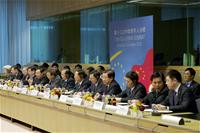 As could be expected, Germany is the motor of the European exports to China with a 47% share. Nevertheless the German balance is also negative although insignificantly.
As could be expected, Germany is the motor of the European exports to China with a 47% share. Nevertheless the German balance is also negative although insignificantly.
It is the huge volume of trade with China that should provoke a debate on how fair trade is, given the official suppression of the Chinese exchange rate. Because the low exchange rates is good for exports. However, the currencies whose value is left to the judgment of markets, are often losers from their high rates. And, again, everything would have been fine if the market dictated the terms. But, as it became clear, this would have been possible with a relative economic convergence.
Regardless of the numerous meetings of Bulgarian politicians in China and in Bulgaria; the signing of economic agreements; the organisation of business forums, the issue of exchange rates is never mentioned (at least in the press releases after such events). On October 6, when the EU-China summit took place in Brussels, the Bulgarian member of the European Parliament from the EPP groups Iliyana Ivanova met with a group of Chinese journalists in the Belgian capital. Her position, though, raises more concern than joy with the fact that after all there is a Bulgarian politician who has raised the issue:
"In the context of the high-level talks in the framework of the EU-China summit being held in Brussels, Ms Ivanova pointed out that the decision for a change of the yuan's exchange rate would make many European partners of China happy, but she stressed that this is a sovereign decision of the Chinese authorities, which they should take when they are fully ready for that". The concern comes from the fact that, yes, China is a sovereign state, but after all the interconnectedness of global market is so advanced that looking for a safe ground in sovereignty could be considered only as being egoistic.
For euinside the former deputy PM (responsible for economy) and foreign minister of Bulgaria, currently an MEP from the Socialists and Democrats group Ivaylo Kalfin commented that "the liberalisation of the exchange rate would strengthen Chinese market's competitiveness and would put in a better situation the imported goods which the locals would have to compete with. The liberalisation of the exchange rate would make the Bulgarian goods more competitive than both on the Chinese market and on third markets where our goods compete with the Chinese. Therefore, Bulgaria's interest as an EU country coincides with that of the euro area countries because our currency board - the lev - is pegged to the euro, which means that an appreciation of the yuan to the euro would relate the same way as to the lev".
And the winner is ....
According to the Financial Times economist Martin Wolf, the winner in the 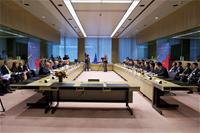 currency wars would be the US. Mr Wolf explains crudely that Washington's currency policy represents a wish to inflate the rest of the world, while the latter is trying to deflate the US. Washington must win since it has infinite ammunition: there is no limit to the dollars the Federal Reserve can create. "What needs to be discussed is the terms of the world’s surrender: the needed changes in nominal exchange rates and domestic policies around the world", the economist writes.
currency wars would be the US. Mr Wolf explains crudely that Washington's currency policy represents a wish to inflate the rest of the world, while the latter is trying to deflate the US. Washington must win since it has infinite ammunition: there is no limit to the dollars the Federal Reserve can create. "What needs to be discussed is the terms of the world’s surrender: the needed changes in nominal exchange rates and domestic policies around the world", the economist writes.
How would China react? Martin Wolf has an answer to this question too: "China objects to the huge US fiscal deficits and unconventional monetary policies. China is also determined to keep inflation down at home and limit the appreciation of its currency. The implication of this policy is clear: adjustments in real exchange rates should occur via falling US domestic prices. China wants to impose a deflationary adjustment on the US, just as Germany is doing to Greece. This is not going to happen. Nor would it be in China’s interest if it did. As a creditor, it would enjoy an increase in the real value of its claims on the US. But US deflation would threaten a world slump".
Martin Wolf's arguments sound very likely. What we still don't know is whether China has realised these arguments and whether it would indeed act as described by Wolf. And another thing we don't know - what trump does China hold in its sleeve. As it became clear earlier this week, China has offered to buy a serious quantity of Greek debt bonds. It might sound soothing in the short or even the mid-term, but this is the same trump with which China is holding the US in its hands, and here we are not just talking about Greece but the entire euro area and those EU members which have their currency pegged to the euro (Bulgaria).
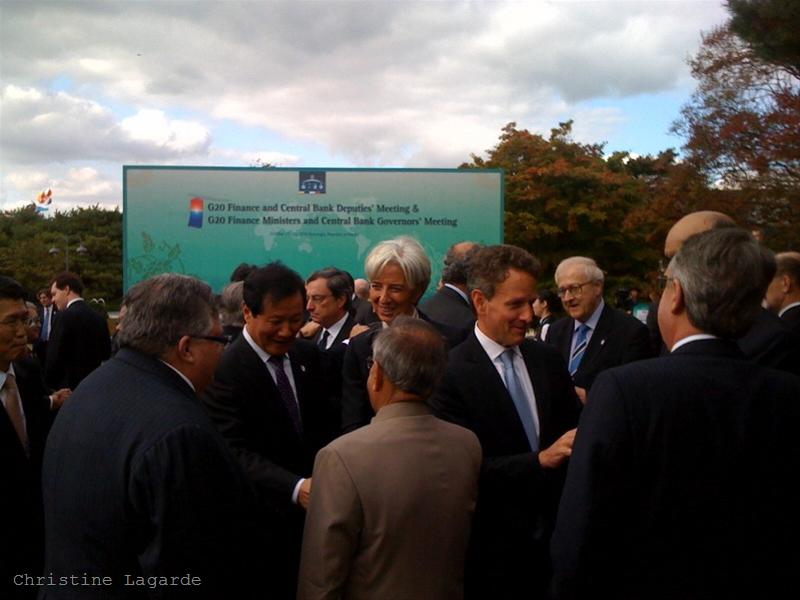 | © Christine Lagarde
| © Christine Lagarde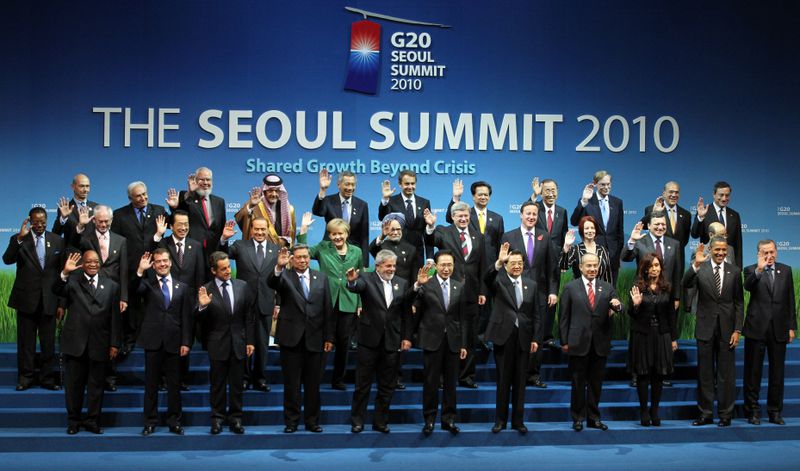 | © G20
| © G20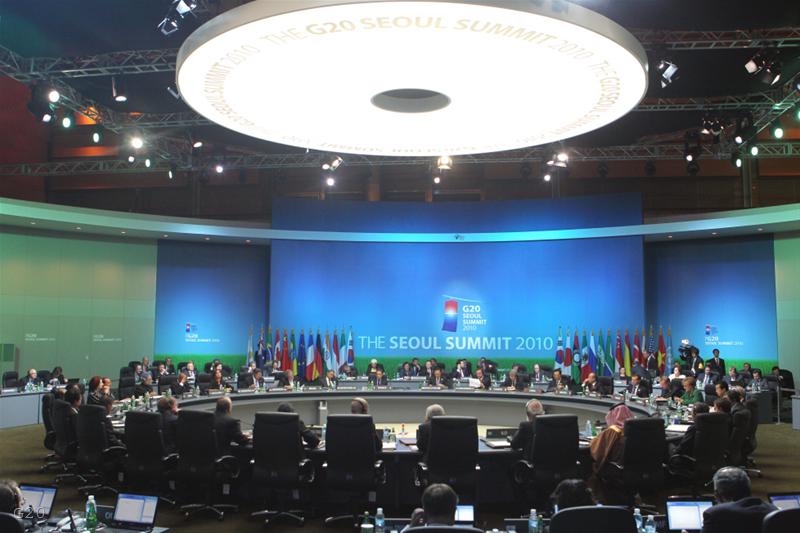 | © G20
| © G20